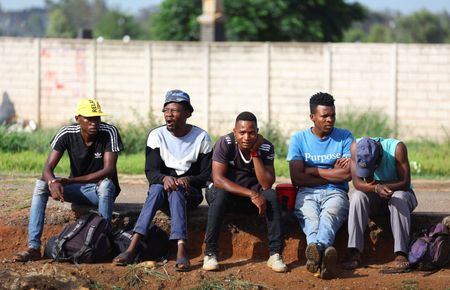JOHANNESBURG (Reuters) -Pep and Ackermans owner Pepkor Holdings on Thursday said sales growth had slowed to 5.1% in the third quarter, due to the non-payment of COVID-19 social grants to consumers and flooding of a major distribution unit in KwaZulu-Natal.
The discount fashion and homewares retailer, majority owned by Steinhoff International Holdings, had posted sales growth of 27.9% in the prior year’s third quarter as the group recovered from the COVID-19 lockdown.
The government introduced the so-called social distress grant in 2020 to help people cope with the economic effects of the COVID-19 pandemic. This fuelled spending at the discounter’s shops that offer value items to cash-strapped shoppers.
But payment of the grants was disrupted in recent months due to administrative changes, sending a shockwave through the retail sector.
Pepkor said problems in the payment of grants had a significant impact on trading in May and June, which negatively impacted performance in its clothing division, especially the Pep and Ackermans chains.
Pepkor said payments had resumed, including back payments.
For the third quarter, sales in Pep and Ackermans stores inched up by 1.7%.
Trading was also impacted by the flooding of its Isiphingo distribution centre in April.
“The distribution centre is currently operating at 50% of normal capacity. This is expected to increase to 80% within the next month and service levels are almost back to normal,” Pepkor said.
Clothing and general merchandise sales rose by 9.7% in the quarter. Furniture, appliances and electronics sales increased by 3.7% against a strong base in the prior year due to pent-up demand.
Building materials sales fell by 1.9% as the market in South Africa continued to be constrained.
For the nine months ended June 30 Pepkor said sales rose by 3.9% to 62.5 billion rand ($3.4 billion) versus the comparable prior year.
($1 = 16.6910 rand)
(Reporting by Nqobile Dludla; Editing by David Evans and David Holmes)









